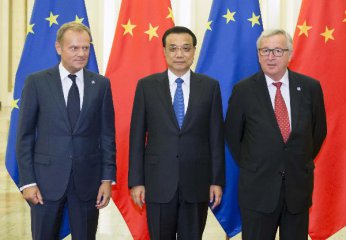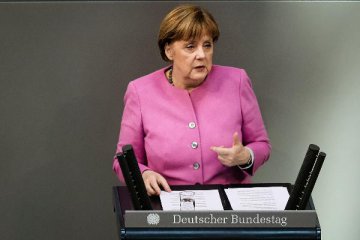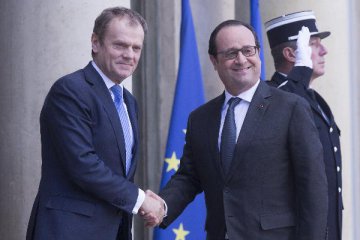
Leaders from the 28 member states of the European Union (EU) on Friday wrapped up a two-day summit in Brussels, seeking to stem flows of irregular migrants, settle a stalled trade deal with Canada, and mount pressure on Russia.
CURBING FLOW OF MIGRANTS
At the first session of the summit, the leaders' discussion focused in particular on external border controls and deals with African countries to reduce the number of illegal migrants.
Hailing the entry into force of the European Border and Coast Guard Regulation on Oct. 6, the EU countries committed themselves to continuing to deploy staff and equipment to the new institution.
In a concluding document of the discussion, the leaders called for "a swift adoption" of a revised Schengen Borders Code to enforce systematic controls on all travelers crossing EU external borders.
Meanwhile, the leaders asked the EU executive body to come up with a proposal for setting up a European Travel Information and Authorization System (ETIAS) to allow for advance security checks on visa-exempt travelers and deny them entry where necessary.
Furthermore, the EU leaders pressed for quicker progress from deals with African countries to reduce the number of irregular migrants, increase returns and try to solve the "root causes" of migration.
The central Mediterranean has once again become the main crossing point for illegal migrants from Africa. More than 115,000 people arrived in Italy by boat in the first eight months of 2016, remaining at the same level as in 2014 and 2015, European Council President Donald Tusk told the press after the first day of the summit.
After accessing the so-called "migration compacts" set up between the EU and five African countries, namely Mali, Niger, Nigeria, Senegal and Ethiopia, the EU leaders agreed to wait until the next summit in December to decide whether to extend it to other countries.
Thanks to the migration deal between the EU and Turkey, the influx of irregular migrants crossing the Aegean Sea to Greece has dropped 98 percent in September compared with last year. Meanwhile, twice as many irregular migrants had already been returned compared to all of 2015, Tusk said.
As to the controversial relocation and resettlement schemes, divergence among the EU countries persists and member states are urged to quickly implement the existing schemes.
SETTLING TRADE DEAL WITH CANADA
Leaders from the 28 member states of the bloc were expected to reach an agreement on approving the Comprehensive Economic and Trade Agreement (CETA) on the second day of the EU summit.
However, due to continued opposition from a region of Belgium, the deal has been thrown into disarray.
"I hope that we will be able to see an agreed settlement in a few days, with the Wallonians, our friends," European Commission President Jean-Claude Juncker told a press conference after the second day of the EU summit.
The Belgian region of Wallonia is blocking the ratification of the deal over social and environmental concerns.
According to local media, Wallonia was still resisting pressure to back the EU-Canada trade deal on Friday morning. The region's leader Paul Magnette said "difficulties remain" for the region to sign the deal. The French-speaking area in southern Belgium fears local workers will be laid off if the agreement leads to cheaper farming and industrial imports.
Juncker said Wallonia's problem with CETA is "not technical or substantial but political." He expressed hope to find a solution in the coming few days as he called CETA "the best trade agreement" the EU has ever negotiated.
The trade deal with Canada could be the bloc's last free trade agreement if it fails, warned European Council President Donald Tusk.
Encouragingly, Romania dropped its opposition to the deal during the summit after securing visa-free access to Canada for its citizens, which starts from Dec. 1, 2017.
"We are in a position to withdraw our reservations against CETA, " Romanian President Klaus Johannis said Friday in Brussels.
The EU-Canada free trade deal was reached in August 2014 after five years of negotiations, aiming to eliminate 98 percent of tariffs between the two sides.
MOUNTING PRESSURE ON RUSSIA
The EU leaders on Friday "held a strategic policy debate on relations with Russia," according to a summary document released after the first day's meeting.
Accusing Russia's strategy of attempting to weaken the EU, Tusk told a news conference that the EU and its member states will continue in their efforts to put pressure on Russia.
As to the situation in the war-torn Aleppo, the EU leaders called for an immediate cessation of hostilities and for a resumption of a credible political process under UN auspices.
"Everything should be done to extend the ceasefire, bring in humanitarian aid to the civilian population and create the conditions for opening negotiations on a political transition in Syria," the document said.
However, the EU warned of the need to consider "all available options" should the situation not improved.
Russia and Syria on Monday announced a humanitarian truce from 8 a.m. to 4 p.m. local time (0600 GMT to 1400 GMT) on Thursday in rebel-held areas of Aleppo, but decided on Wednesday to extend it for another three hours. The ceasefire is aimed at ensuring the safe exit of civilians via humanitarian corridors and the evacuation of the wounded and sick.





















Latest comments